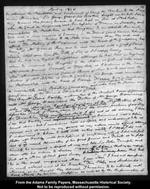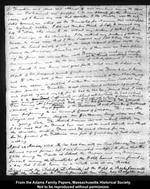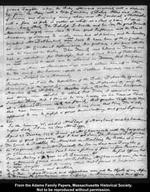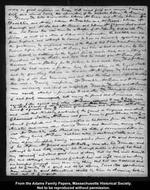April 19, 1778
he obtained the Reputation and Emoluments of being the Banker to the American Ministers. Sir George Grand his Brother, might contribute something towards this favour, because he had kept an Inn at Stockholm when the Count de Vergennes was Ambassador of France in Sweeden, and accomplished the Revolution in that Kingdom to an absolute Monarchy. This was a mere measure of Economy in the French Court, because, before, it had cost them in Bribes to the States more money than they could well afford. The Meeting of De Vergennes with the heads of the Conspiracy had been held at Mr. Grands Inn, and he was rewarded with a Cross of Saint Louis, which gave him the Title of Sir, as I suppose, having never heard that he had any English Knighthood although he had lived in England where he married his Daughter to the Major or Colonel who was afterwards General Provost. This Lady as I presume is the same who afterwards married Colonel Burr of New York and was the Mother of Mrs. Alston of South Carolina. Sir George was connected in Partnership with the House of Horneca Fizeaux & Co. in Amsterdam, a mercantile and Banking Company, and who had or were supposed to have the favour and Confidence of the French Ministers of State.
This Day Mr. David Hartley, a Member of the British House of Commons, with Mr. George [i.e. William] Hammond the Father of Mr. George Hammond who was afterwards Hartleys Secretary at the Negotiation of the definitive Treaty of Peace, and after that Minister Plenipotentiary to the United States, came to Visit Us, under pretence of visiting Dr. Franklin. This mysterious Visit, I did not at all admire. I soon saw that Hartley was as great a Coxcomb a Person of as consummate Vanity as Hammond was a plain honest Man: but I considered both as Spies, and endeavoured to be as reserved and as much on my guard as my nature would admit. Although I endeavoured to behave to both with entire civility, I suppose as I did not flatter Mr. Hartley with professions of confidence, which I did not feel, and of so much Admiration of his Great Genius and Talents as he felt himself, he conceived a disgust at me, and told Sir John Temple and others after his return to London "Your Mr. Adams that you represent as a Man of such good Sense, I believe he may have that, but If he has that, he is the most ungracious Man I ever saw." I had not expressed so much astonishment at his Invention of Fire Plates, and Archimides's Mirrors, as he thought they deserved. I knew him to be intimate with Lord North by his own confession as well as by the Information of
Dr. Franklin and others: and although he was numbered among the Opposition in Parliament and professed to be an Advocate for the American cause, yet I knew very well that Opposition to the Ministry was the only solid Ground, on which all the Friendship for America, that was professed in England, rested. I did not therefore think it safe, to commit myself to a Man, who came to Us without any pretence of Authority from his Sovereign or his Ministers. I say without any pretence of Authority because he made none. But I then supposed and still believe, that he came with the secret privity if not at the express request of Lord North to sound the American Ministers, and see if there were no hopes of seducing Us from our connection with France, and making a seperate Accommodation with Us, the very idea of which as the Treaty was already made appeared to me to be an Insult to our honor and good faith. What were the Subjects or the Objects of his freequent private Conferences with Franklin I know not. If either or both of them ever made any minutes of them I hope they will one day appear in publick. I neither then nor ever since suspected any unfair practice in Franklin except some secret Whispers against Lee and possibly against myself, for he had by this time found that I was not to be his Tool sufficiently complyant with his Views. He had indeed seen enough of me in Congress, to know that [I] was not a Man to swear, in the Words of another at all times.
Dr. Franklin and others: and although he was numbered among the Opposition in Parliament and professed to be an Advocate for the American cause, yet I knew very well that Opposition to the Ministry was the only solid Ground, on which all the Friendship for America, that was professed in England, rested. I did not therefore think it safe, to commit myself to a Man, who came to Us without any pretence of Authority from his Sovereign or his Ministers. I say without any pretence of Authority because he made none. But I then supposed and still believe, that he came with the secret privity if not at the express request of Lord North to sound the American Ministers, and see if there were no hopes of seducing Us from our connection with France, and making a seperate Accommodation with Us, the very idea of which as the Treaty was already made appeared to me to be an Insult to our honor and good faith. What were the Subjects or the Objects of his freequent private Conferences with Franklin I know not. If either or both of them ever made any minutes of them I hope they will one day appear in publick. I neither then nor ever since suspected any unfair practice in Franklin except some secret Whispers against Lee and possibly against myself, for he had by this time found that I was not to be his Tool sufficiently complyant with his Views. He had indeed seen enough of me in Congress, to know that [I] was not a Man to swear, in the Words of another at all times.
This Evening Mr. Chaumont took me in his Carriage to The Concert Spirituel, in the Royal Garden Pallace of the Tuilleries. A vast Number of Instruments were performing to an immense Crowd of Company. There were Men Singers and Women Singers. One Gentleman sung alone and then a young Lady. The Musick however did not entirely satisfy me. I had read that the French Ear was not the most delicate, and I thought the Observation verified. There was too much sound for me. The Gardens of the Tuilleries were full of Company of both Sexes walking.




